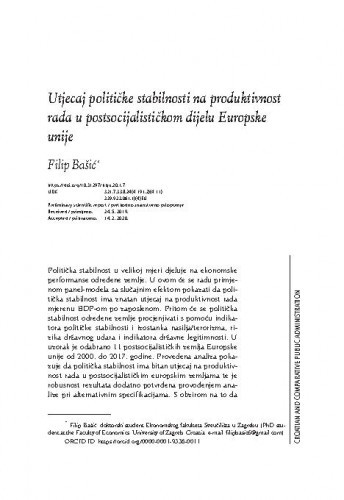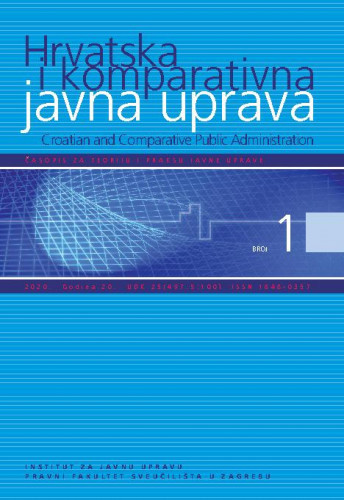Politička stabilnost u velikoj mjeri djeluje na ekonomske performanse određene zemlje. U ovom će se radu primjenom panel-modela sa slučajnim efektom pokazati da politička stabilnost ima znatan utjecaj na produktivnost rada mjerenu BDP-om po zaposlenom. Pritom će se politička stabilnost određene zemlje procjenjivati s pomoću indikatora političke stabilnosti i izostanka nasilja/terorizma, rizika državnog udara i indikatora državne legitimnosti. U uzorak je odabrano 11 postsocijalističkih zemlja Europske unije od 2000. do 2017. godine. Provedena analiza pokazuje da politička stabilnost ima bitan utjecaj na produktivnost rada u postsocijalističkim europskim zemljama te je robusnost rezultata dodatno potvrđena provođenjem analize pri alternativnim specifikacijama. S obzirom na to da se u postojećim radovima većinom nastojalo otkriti uzroke političke nestabilnosti i kako ih spriječiti, ovaj rad stavlja naglasak na posljedice političke nestabilnosti na produktivnost i gospodarstvo u cjelini.; Economic performance of a specific country is, to a large extent, affected by political stability. The aim of this paper is to show that political stability has a significant impact on labour productivity measured by GDP per person employed. An analysis has been made using the random-effects model on three different measures for estimating political stability of a specific country: political stability and absence of violence/terrorism, risk of coup, and state legitimacy. The sample consists of 11 post-socialist EU countries for the period between 2000 and 2017. The results indicate that political stability has a significant impact on labour productivity in post-socialist European countries. The robustness of results has been further conferment by alternative model specification. Given the fact that the majority of existing literature focuses on the causes of political instability and the measures of preventing them, this paper primarily points out the consequences of political instability on labour productivity and the economy.
Sažetak

 Hrvatska i komparativna javna uprava : časopis za teoriju i praksu javne uprave = Croatian and comparative public administration : [a journal for theory and practice of public administration] 20, 1(2020) / glavni i odgovorni urednik, editor-in-chief Ivan Koprić.
Hrvatska i komparativna javna uprava : časopis za teoriju i praksu javne uprave = Croatian and comparative public administration : [a journal for theory and practice of public administration] 20, 1(2020) / glavni i odgovorni urednik, editor-in-chief Ivan Koprić.